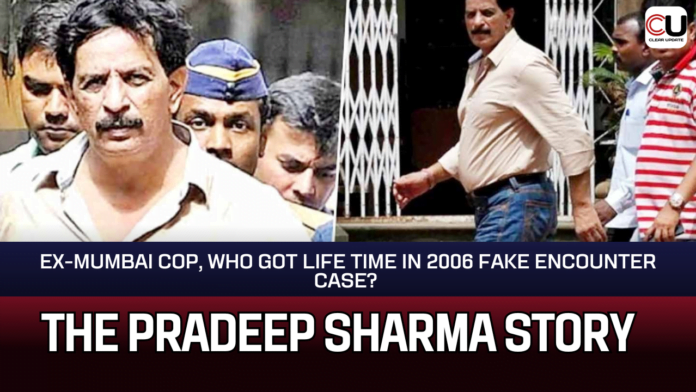Pradeep Sharma Story
Pradeep Sharma is a former officer in the Mumbai police who gained notoriety as an “encounter specialist” with the Mumbai Encounter Squad. He was involved in the deaths of over 312 criminals, including notorious crime bosses and terrorists belonging to the Lashkar-e-Taiba. Sharma was dismissed from the Mumbai police in 2008 for involvement and contacts with criminals, but was reinstated in 2017 after resigning from the Mumbai police in July 2019 after a 35-year career. He officially joined the ruling Shiv Sena in Maharashtra on September 13, 2019, and contested from Nalasopara seat in the Maharashtra assembly polls but lost to Bahujan Vikash Aghadi’s candidate.
In 2006, Sharma was convicted and sentenced to life imprisonment in a fake encounter case involving Lakhan Bhaiya, a member of the Chhota Rajan gang. The Bombay High Court held that Lakhan Bhaiya was killed by the police in a staged encounter and that Sharma, along with 12 other policemen and a civilian, Hitesh Solanki, were responsible for his death.
The Enigma: Who is Pradeep Sharma?
Pradeep Sharma, often dubbed ‘Mumbai’s Dirty Harry‘ rose to prominence within the ranks of the Mumbai Police force due to his purported involvement in encounters with notorious criminals. Hailing from the 1983 batch of the Maharashtra Police Academy, Sharma’s tenure coincided with a tumultuous period marked by the reign of underworld figures like Dawood Ibrahim Kaskar and Chhota Rajan. His alleged tally of 112 eliminations, including gangsters and terrorists, fueled his notoriety, painting him as a formidable force against organized crime.
The Rise and Fall: A Chronicle of Controversy
The Bombay High Court, on Tuesday, sentenced former Mumbai Police encounter specialist Pradeep Sharma to life imprisonment while upholding the life imprisonment awarded to 13 others, including 12 police personnel, in the case of the fake encounter killing of Lakhan Bhaiya in… pic.twitter.com/6lYR19MpDn
— Live Law (@LiveLawIndia) March 19, 2024
Sharma’s trajectory, however, was not devoid of controversy. Accusations of collusion with the very underworld he purportedly fought against tarnished his reputation. Dismissed from service in 2008 amid allegations of illicit connections and amassing disproportionate wealth, Sharma found himself entangled in a legal quagmire. Despite acquittal in the 2010 encounter case involving Lakhan Bhaiya, the shadow of suspicion lingered, casting doubt on his integrity.
The Lakhan Bhaiya Case: Peering into the Heart of Darkness
Central to Sharma’s downfall was the 2006 encounter of Ramnarayan Gupta, alias Lakhan Bhaiya, a suspected member of the Chhota Rajan gang. What transpired on that fateful day laid bare the inherent flaws within Mumbai’s law enforcement machinery. Lakhan Bhaiya’s brother, advocate Ramprasad Gupta, mounted a relentless pursuit of justice, decrying the encounter as staged and demanding accountability.
Read Also: Sidhu Moosewala: Parents Joyfully Welcome a Baby Boy! View the Pic | Clear Update
The Verdict: Justice Prevails Amidst the Shadows
The recent verdict by the Bombay High Court, overturning Sharma’s acquittal and sentencing him to life imprisonment, signifies a pivotal moment in the annals of Mumbai’s judicial history. The court’s scathing indictment of the police’s actions, labeling the encounter as “fake” and “perverse” underscores the systemic rot that permeated the force. With Sharma and 13 others facing the brunt of justice, the message is clear – impunity has no place in a society governed by the rule of law.
Charting a Path Forward: Lessons Learned and Reforms Needed
As Mumbai grapples with the aftermath of this landmark verdict, introspection is imperative. The Pradeep Sharma case serves as a sobering reminder of the dangers posed by unchecked power and the imperative of institutional reform. Strengthening oversight mechanisms, fostering a culture of accountability, and upholding the principles of justice are paramount in preventing the recurrence of such travesties.
In conclusion, the saga of Pradeep Sharma encapsulates the complexities and contradictions inherent within Mumbai’s law enforcement apparatus. While his exploits may have garnered headlines, it is the pursuit of truth and justice that ultimately defines his legacy. As Mumbai charts a path forward, guided by the principles of transparency and accountability, the shadows of the past must serve as a catalyst for meaningful change.




